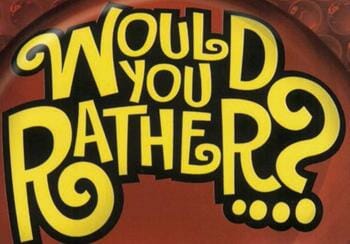Playing ‘Would You Rather’ With Your Interviewer


Admit it – interviewing is rarely a fun game to play in Candy Land; you can find yourself navigating through chutes and ladders in a trivial pursuit to find a clue to the right job without taking much risk and landing in a taboo situation only to hear the dreaded, “Sorry.” Even in the best of situations, you are juggling various options and gauging multiple choices trying to decide what you would rather do. And so the game theme continues, as we are right back to the timeless game of “Would You Rather.” Here’s a crash course to guide you through the most common Would You Rather questions:
Would you rather interview on the phone at 9 a.m. Monday morning or in person at 5 p.m. Friday?
The 9 a.m. spot lends the opportunity to demonstrate alertness and eagerness at the very beginning of the work week, sounding sharp and on the ball when most people are asleep at their desks. On the other end of the spectrum, 5 p.m. Friday displays dedication and commitment to the job, not running away for the weekend and checking out both physically and mentally as soon as possible.
The key difference here is between phone and in-person interviews. Your interviewer could have a plethora of things waiting for her at work after the weekend and not give you 100 percent of her attention. When face to face, all of your interviewer’s attention is on you and distractions wait quietly at the door. This attention can work to your benefit or detriment; if you are 100 percent prepared for the interview and eager to wow them, push for an in-person interview. If you are not 100 percent ready and can use the aid of a computer screen/notes in front of you, push for the 9 a.m. call where you can mask your insufficient preparation with upbeat and contagious enthusiasm.
Would you rather have your potential employer check your LinkedIn profile or resume?
Here’s a poignant example of the battle between old school and new age. Having a LinkedIn page in-and-of itself shows that you are digitally savvy, connected to the social network, and active in the cyber community. Most importantly, unlike resumes, LinkedIn profiles boast your recommendations no matter how plentiful or lengthy, revealing who recommends you and allowing the viewer access to the recommender’s profile. This simple addition can accelerate the process and open up new alleys to background checks.
The benefits of the resume are strong as well; they are much easier to control/craft to highlight your qualities. In resumes, it is easier to cover up gaps in employment and other such unfavorable facts (LinkedIn profiles are organized chronologically, which makes this difficult). Your resume can include more personal and confidential information such as quotas, bonuses, clients, etc. that are extremely helpful to an interviewer but not appropriate for a publicly-displayed online profile.
Nowadays, your interviewer will most likely check both your resume and LinkedIn profile simultaneously, so keep them up to par. I would recommend sending your resume instead of your LinkedIn profile because it maintains an air of seniority and confidentiality; everyone can look at your LinkedIn profile, only those to whom you send it can see your resume.
Would you rather send a handwritten note, email, or phone call after an interview?
By now, no one should underestimate the power of a follow-up note; it has been shown to sway opinions from “Yes” to “No” and vice versa. Time, effort, and content are all considered and these factors explain which mode is best.
Handwritten notes demonstrate time and care, but lack spell check and neatness. If you have sloppy handwriting, don’t even think about writing it. Mailing in a handwritten letter could take five to eight days and follow-up notes should come within 24 hours of the interview. To show complete dedication, write or type and print a well-thought-out thank you note and either overnight it or bring it by hand to the office. There’s no way to misunderstand that as anything but serious. Maybe a little creepy, but serious.
Such extremes are not completely necessary and an email is fine. Triple-check everything and email each interviewer individually – they talk and will notice a template. Emails are efficient and quick, and they show that you are tech savvy and can handle a computer. The email itself won’t stand out, so make sure the content does.
Phone calls are far more casual and that depends on your relationship with the interviewer; when in doubt, err on the side of formal. Whatever you do, do not text a follow-up note.
Remember, the process is just as much a game for the interviewer as it is for the interviewee; keep a chess mind and always be one step ahead of your opponents. Soon enough, they will be your teammates.
Stay tuned for another guide to “Would You Rather” coming soon to ClickZ.
